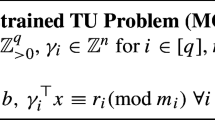Abstract
There has been significant work recently on integer programs (IPs) \(\min \{c^\top x :Ax\le b,\,x\in \mathbb {Z}^n\}\) with a constraint marix A with bounded subdeterminants. This is motivated by a well-known conjecture claiming that, for any constant \(\varDelta \in \mathbb {Z}_{>0}\), \(\varDelta \)-modular IPs are efficiently solvable, which are IPs where the constraint matrix \(A\in \mathbb {Z}^{m\times n}\) has full column rank and all \(n\times n\) minors of A are within \(\{-\varDelta , \dots , \varDelta \}\). Previous progress on this question, in particular for \(\varDelta =2\), relies on algorithms that solve an important special case, namely strictly \(\varDelta \)-modular IPs, which further restrict the \(n\times n\) minors of A to be within \(\{-\varDelta , 0, \varDelta \}\). Even for \(\varDelta =2\), such problems include well-known combinatorial optimization problems like the minimum odd/even cut problem. The conjecture remains open even for strictly \(\varDelta \)-modular IPs. Prior advances were restricted to prime \(\varDelta \), which allows for employing strong number-theoretic results.
In this work, we make first progress beyond the prime case by presenting techniques not relying on such strong number-theoretic prime results. In particular, our approach implies that there is a randomized algorithm to check feasibility of strictly \(\varDelta \)-modular IPs in strongly polynomial time if \(\varDelta \le 4\).
Funded through the Swiss National Science Foundation grants 200021_184622 and P500PT_206742, the European Research Council (ERC) under the European Union’s Horizon 2020 research and innovation programme (grant agreement No 817750), and the Deutsche Forschungsgemeinschaft (DFG, German Research Foundation) under Germany’s Excellence Strategy – EXZ-2047/1 – 390685813.
Access this chapter
Tax calculation will be finalised at checkout
Purchases are for personal use only
Similar content being viewed by others
Notes
- 1.
A weaker variant of the conjecture claims efficient solvability of IPs with totally \(\varDelta \)-modular constraint matrices, where all subdeterminants are bounded by \(\varDelta \) in absolute value. The conjecture involving \(\varDelta \)-modular matrices implies the weaker variant. Indeed, an IP \(\min \{c^\top x :Ax \le b, x\in \mathbb {Z}^n\}\) with a totally \(\varDelta \)-modular constraint matrix can be reformulated as \(\min \{c^\top (x^+-x^-) :A(x^+-x^-)\le b, x^+, x^- \in \mathbb {Z}_{\ge 0}^n\}\). It is not hard to see that the constraint matrix of the new LP remains totally \(\varDelta \)-modular; moreover, it has full column rank because of the non-negativity constraints.
- 2.
To capture an MCCTU problem as a strictly \(\varDelta \)-modular IP, replace each congruency constraint \(\gamma _i^\top x \equiv r_i\pmod {m_i}\) by an equality constraint \(\gamma _i^\top x + m_i y_i = r\) with \(y_i\in \mathbb {Z}\). The corresponding constraint matrix is strictly \(\varDelta \)-modular for \(\varDelta =\prod _{i=1}^q m_i\).
- 3.
In fact, the proof in [24] claims a reduction to a submodular minimization problem, but shows the stronger one presented here.
- 4.
We recall that a lattice \(\mathcal {L}\subseteq 2^N\) is a set family such that for any \(A,B\in \mathcal {L}\), we have \(A\cap B, A\cup B\in \mathcal {L}\). We assume such a lattice to be given by a compact encoding in a directed acyclic graph H on the vertex set N such that \(X\subseteq N\) is an element of the lattice if and only if \(\delta _H^-(X)=\emptyset \) (cf. [20, Section 10.3]). Here, as usual, in a digraph \(G=(V,A)\) and for \(X\subseteq V\), we denote by \(\delta ^+(X)\) and \(\delta ^-(X)\) the arcs in A leaving and entering X, respectively. Moreover, we write \(\delta ^\pm (v){:}{=}\delta ^\pm (\{v\})\) for \(v\in V\).
- 5.
For simplicity, we use a notion of a 3-sum that allows one or both of \(ef^\top \) and \(gh^\top \) to be zero matrices. Typically, those cases would be called 2- and 1-sums, respectively.
References
Aprile, M., Fiorini, S.: Regular matroids have polynomial extension complexity. Math. Oper. Res. 47(1), 540–559 (2021). https://doi.org/10.1287/moor.2021.1137
Artmann, S., Eisenbrand, F., Glanzer, C., Oertel, T., Vempala, S., Weismantel, R.: A note on non-degenerate integer programs with small sub-determinants. Oper. Res. Lett. 44(5), 635–639 (2016). https://doi.org/10.1016/j.orl.2016.07.004
Artmann, S., Weismantel, R., and Zenklusen, R.: A Strongly Polynomial Algorithm for Bimodular Integer Linear Programming. In: Proceedings of the 49th Annual ACM Symposium on Theory of Computing (STOC ’17), pp. 1206–1219, Montreal (2017). https://doi.org/10.1145/3055399.3055473
Averkov, G., Schymura, M.: On the Maximal Number of Columns of a \(\varDelta \) - modular Matrix. In: Proceedings of the 23rd International Conference on Integer Programming and Combinatorial Optimization (IPCO ’22), pp. 29–42, Eidhoven (2022). https://doi.org/10.1007/978-3-031-06901-7_3
Barahona, F., Conforti, M.: A construction for binary matroids. Discret. Math. 66(3), 213–218 (1987). https://doi.org/10.1016/0012-365X(87)90097-5
Bonifas, N., Di Summa, M., Eisenbrand, F., Hähnle, N., Niemeier, M.: On Sub-determinants and the Diameter of Polyhedra. Discrete Comput. Geometry 52(1), 102–115 (2014). https://doi.org/10.1007/s00454-014-9601-x
Camerini, P.M., Galbiati, G., Maffioli, F.: Random pseudo-polynomial algorithms for exact matroid problems. J. Algorithms 13, 258–273 (1992). https://doi.org/10.1016/0196-6774(92)90018-8
Di Summa, M., Eisenbrand, F., Faenza, Y., Moldenhauer, C.: On Largest Volume Simplices and Sub-determinants. In: Proceedings of the 26th Annual ACMSIAM Symposium on Discrete Algorithms (SODA ’15), pp. 315–323, San Diego (2015). https://doi.org/10.1137/1.9781611973730.23
Dinitz, M., Kortsarz, G.: Matroid secretary for regular and decomposable matroids. SIAM J. Comput. 43(5), 1807–1830 (2014). https://doi.org/10.1137/13094030X
Eisenbrand, F., Vempala, S.: Geometric random edge. Math. Program. 1, 325–339 (2016). https://doi.org/10.1007/s10107-016-1089-0
Fiorini, S., Joret, G., Weltge, S., and Yuditsky, Y.: Integer programs with bounded subdeterminants and two nonzeros per row. In: Proceedings of the 62nd Annual Symposium on Foundations of Computer Science (FOCS ’22), pp. 13–24 (2022). https://doi.org/10.1109/FOCS52979.2021.00011
Glanzer, C., Stallknecht, I., and Weismantel, R.: On the recognition of a, b, c- modular matrices. In: Proceedings of the 22nd International Conference on Integer Programming and Combinatorial Optimization (IPCO ’21), pp. 238–251, Atlanta (2021). https://doi.org/10.1007/978-3-030-73879-2_17
Glanzer, C., Weismantel, R., Zenklusen, R.: On the number of distinct rows of a matrix with bounded subdeterminants. SIAM J. Discret. Math. 32(3), 1706–1720 (2018). https://doi.org/10.1137/17M1125728
Goemans, M.X., Ramakrishnan, V.S.: Minimizing submodular functions over families of sets. Combinatorica 15(4), 499–513 (1995). https://doi.org/10.1007/BF01192523
Gribanov, D., Shumilov, I., Malyshev, D., Pardalos, P.: On \(\varDelta \)-modular integer linear problems in the canonical form and equivalent problems. J. Global Optim. (2022). https://doi.org/10.1007/s10898-022-01165-9
Gribanov, D.V.: An FPTAS for the \(\varDelta \)-modular multidimensional knapsack problem. In: Proceedings of the International Conference on Mathematical Optimization Theory and Operations Research (MOTOR), pp. 79–95 (2021). https://doi.org/10.1007/978-3-030-77876-7_6
Gribanov, D.V., Zolotykh, N.Y.: On lattice point counting in \(\varDelta \)-modular polyhedra. Optim. Lett. (1), 1–28 (2021). https://doi.org/10.1007/s11590-021-01744-x
Gribanov, D.V., Veselov, S.I.: On integer programming with bounded determinants. Optim. Lett. 10(6), 1169–1177 (2015). https://doi.org/10.1007/s11590-015-0943-y
Grötschel, M., Lovász, L., Schrijver, A.: Corrigendum to our paper ‘The ellipsoid method and its consequences in combinatorial optimization’. Combinatorica 4(4), 291–295 (1984). https://doi.org/10.1007/BF02579139
Grötschel, M., Lovász, L., Schrijver, A.: Geometric Algorithms and Combinatorial Optimization. Springer, Cham (1993). https://doi.org/10.1007/978-3-642-78240-4
Heller, I.: On linear systems with integral valued solutions. Pac. J. Math. 7(3), 1351–1364 (1957). https://doi.org/10.2140/pjm.1957.7.1351
Lee, J., Paat, J., Stallknecht, I., Xu, L.: Improving proximity bounds using sparsity. In: Baïou, M., Gendron, B., Günlük, O., Mahjoub, A.R. (eds.) ISCO 2020. LNCS, vol. 12176, pp. 115–127. Springer, Cham (2020). https://doi.org/10.1007/978-3-030-53262-8_10
Lee, J., Paat, J., Stallknecht, I., Xu, L.: Polynomial upper bounds on the number of differing columns of \(\varDelta \)-modular integer programs. Math. Oper. Res. (2022). https://doi.org/10.1287/moor.2022.1339
Nägele, M., Santiago, R., Zenklusen, R.: Congruency-constrained TU problems beyond the bimodular case. In: Proceedings of the 33rd Annual ACM-SIAM Symposium on Discrete Algorithms (SODA 2022), pp. 2743–2790 (2022). https://doi.org/10.1137/1.9781611977073.108
Nägele, M., Sudakov, B., Zenklusen, R.: Submodular minimization under congruency constraints. Combinatorica 39(6), 1351–1386 (2019). https://doi.org/10.1007/s00493-019-3900-1
Nägele, M., Zenklusen, R.: A new contraction technique with applications to congruency-constrained cuts. Math. Program. (6), 455–481 (2020). https://doi.org/10.1007/s10107-020-01498-x
Nikolov, A.: Randomized rounding for the largest simplex problem. In: Proceedings of the 47th Annual ACM Symposium on Theory of Computing (STOC 2015), pp. 861–870, Portland (2015). https://doi.org/10.1145/2746539.2746628
Paat, J., Schlöter, M., Weismantel, R.: The integrality number of an integer program. Math. Program. (6), 1–21 (2021). https://doi.org/10.1007/s10107-021-01651-0
Padberg, M.W., Rao, M.R.: Odd minimum cut-sets and b-matchings. Math. Oper. Res. 7(1), 67–80 (1982). https://doi.org/10.1287/moor.7.1.67
Schrijver, A.: Theory of Linear and Integer Programming. Wiley, New York (1998)
Seymour, P.D.: Decomposition of regular matroids. J. Comb. Theory, Ser. B 28(3), 305–359 (1980). https://doi.org/10.1016/0095-8956(80)90075-1
Tardos, É.: A strongly polynomial algorithm to solve combinatorial linear programs. Oper. Res. 34(2), 250–256 (1986). https://doi.org/10.1287/opre.34.2.25
Veselov, S.I., Chirkov, A.J.: Integer program with bimodular matrix. Discret. Optim. 6(2), 220–222 (2009). https://doi.org/10.1016/j.disopt.2008.12.002
Author information
Authors and Affiliations
Corresponding author
Editor information
Editors and Affiliations
Rights and permissions
Copyright information
© 2023 The Author(s), under exclusive license to Springer Nature Switzerland AG
About this paper
Cite this paper
Nägele, M., Nöbel, C., Santiago, R., Zenklusen, R. (2023). Advances on Strictly \(\varDelta \)-Modular IPs. In: Del Pia, A., Kaibel, V. (eds) Integer Programming and Combinatorial Optimization. IPCO 2023. Lecture Notes in Computer Science, vol 13904. Springer, Cham. https://doi.org/10.1007/978-3-031-32726-1_28
Download citation
DOI: https://doi.org/10.1007/978-3-031-32726-1_28
Published:
Publisher Name: Springer, Cham
Print ISBN: 978-3-031-32725-4
Online ISBN: 978-3-031-32726-1
eBook Packages: Computer ScienceComputer Science (R0)




